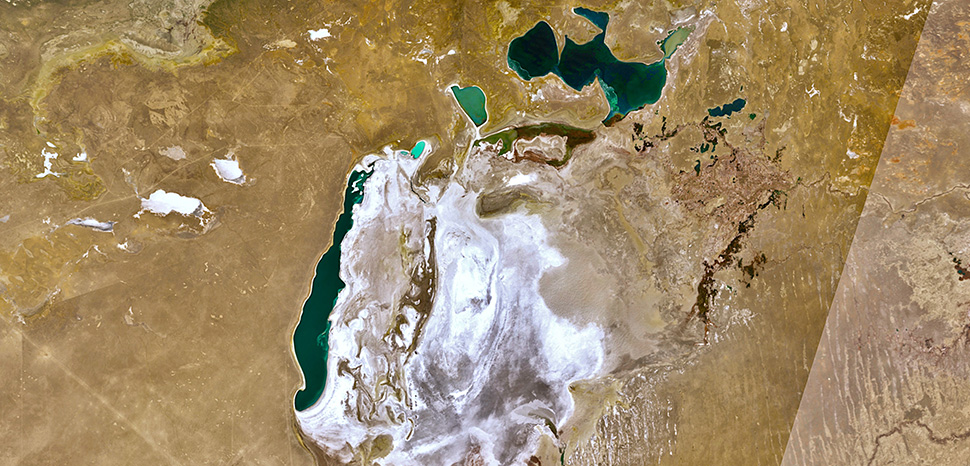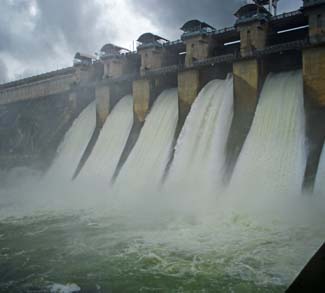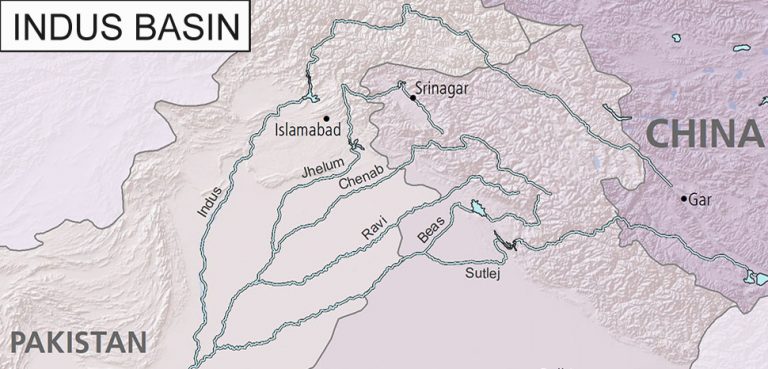Kazakhstani President Kassym-Jomart Tokayev gave a speech on 1 September focusing on economic issues and domestic development. Some key energy and environmental issues were discussed that are particularly noteworthy, given the globe’s climate and environmental challenges: Astana will focus more heavily on protecting the country’s water resources, which has an unavoidable foreign policy component. Moreover, the Kazakhstani government aims to turn to green energy and is similarly considering nuclear power.
Protect the Blue
Several water-related initiatives were mentioned during the speech, including creating a National Hydrogeological Service. Moreover, the president pledged that the “entire water management system” of the country will undergo reform. “Taking into account the population and economic growth trends, by 2040, the water deficit in Kazakhstan could reach 12-15 billion cubic meters,” he warned.
As a landlocked state suffering from climate change and global warming, Kazakhstan must protect and preserve its precious water resources, including Lake Balkhash, the Aral Sea, the Ural River, and the Caspian Sea. In an essay for the academic journal SAIS Review of International Affairs, titled “Kazakhstan’s Green Strategy: Keeping the Steppe Green,” I discussed Kazakhstan’s environmental challenges, including water issues.
Interestingly, the country’s four major water bodies are all shared with neighboring states: the Ural River is born in Russia; the Aral Sea is shared with Uzbekistan; Lake Balkhash is fed by the Ili River, which originates in China; while Azerbaijan, Iran, Russia, Turkmenistan, and Kazakhstan share the Caspian Sea. Each body of water presents its own set of challenges. For example, the waters of the Ural are polluted by Russian industrial waste before arriving in Kazakhstan. The shrinking of the Aral Sea has been well-documented. Similarly, China is building dams and irrigation projects as part of its controversial development projects in Xinjiang province (which borders Kazakhstan). These projects are, and will continue to, affect water flows to Lake Balkhash.
Finally, the Caspian Sea faces various challenges, such as pollution, marine life depredation, and climate change’s effects. The Convention of Tehran was signed in 2003 to protect the Sea, but this has largely not occurred. Ironically, in the middle of the war in Ukraine, Moscow ratified the Moscow Protocol to the Convention this past 15 August. “The Protocol is now ratified by all the five members of the Tehran Convention and will be the second Protocol to the Convention to enter into force,” explains the Convention’s website.
In his September speech, President Tokayev highlighted the importance of regional cooperation to address water issues without naming specific countries or issues: “Our country depends on transboundary water resources. The rivers and canals of Eurasia are a common natural heritage designed to unite peoples and economies. On this issue, you must always find understanding and mutually beneficial consensus with your neighbors and friends. Therefore, carrying out a verified water policy and resolving issues of transboundary water use are the most important tasks of the government.”
Thus, Kazakhstan must draft a comprehensive and rational policy for the future of the country’s water bodies. The country’s devastating 2021 drought and current water shortage in southern Kazakhstan are reminders that new water policies and strategies cannot wait.
Moreover, as the president mentioned, water policies can be a catalyst to promote Central Asian and Trans-Caspian regional cooperation, given that other regional states have similar water-related challenges. Joint water policies must be implemented rather than fighting over water. (Coincidentally, a recent Foreign Policy article is provocatively titled “The Water Wars are Coming to Central Asia,” hopefully that will not occur.) “Water resources are no less important for our country than oil, gas, or metals,” the Kazakhstani leader proclaimed.
Going Green
Besides protecting Kazakhstan’s water resources, the president said Astana is also looking to focus on a green economy as the global transition to clean energy “is inevitable.” The country’s current goal is to be carbon neutral by 2060. Renewable energy generation is slowly growing, which will help achieve this objective. The president said total generation increased by 5% over the past five years, and “by 2027, another 1.4 gigawatts of capacity will be added.” “The development of hydroelectric power stations deserves special attention,” noted Tokayev, in addition to developing better energy storage systems and engaging in carbon trading.
Currently, Kazakhstan heavily relies on coal for energy production, a significant pollution source, particularly in areas like Almaty, where air pollution is a problem, while gas energy remains limited. Hence, President Tokayev stressed the need to “gasify” the country by accelerating the construction of new gas processing plants. “Expanding the resource base of commercial gas is a priority task for the government and the national gas company. It is necessary to accelerate the construction of new gas processing plants, as well as the full involvement of existing processing capacities.”
Moreover, the Astana International Financial Centre (AIFC) was called out, with the president noting that the AIFC must become the leading platform in the region for attracting green funding. The Centre has already created the Green Finance Centre (GFC) for this objective; however, the GFC’s effectiveness so far has been limited.
“Kazakhstan, in principle, should not import electricity and be dependent on neighboring countries,” Tokayev concluded. Given the complex international situation and the possibility of future inter-state tensions and conflict, countries across the globe are eagerly attempting to minimize their energy dependency and create supply chains with reliable partners, not potential foes.
Going Nuclear?
Finally, President Tokayev pronounced that the Kazakhstani people should decide on the potential construction of a nuclear power plant via a referendum. A nuclear power plant could certainly address energy and pollution problems simultaneously. Moreover, Astana has vast uranium reserves, which Kazatomprom extracts; hence, uranium supply for a hypothetical nuclear plant would not be a challenge.
Nuclear energy is a sensitive topic for Kazakhstan, given that the country was the site of dozens of nuclear tests during the Soviet Union era. The effects of testing and radiation continue to affect the population and environment today. (Togzhan Kassenova’s Atomic Steppe book summarizes nuclear testing during Soviet times and independent Kazakhstan’s decision to eliminate its nuclear arsenal.) The Kazakhstani leader outlined the country’s options: “On the one hand, Kazakhstan, as the largest uranium producer in the world, should have its own nuclear power generation. Some experts are in favor of building stations with small reactors. On the other hand, many citizens and a number of experts have concerns about the safety of nuclear power plants. And this is understandable, given the tragic legacy of the Semipalatinsk nuclear test site.”
In a 9 September LinkedIn post, Alessandro Blasi, Special Advisor to the Executive Director of the International Energy Agency (IEA), noted: “the energy crisis triggered by Russia’s invasion of Ukraine is changing the thinking and approach on the role of nuclear power in the #future energy mix of many countries, including across Europe and elsewhere.” Blasi also mentioned the newer, smaller reactors currently available: “also [there is] progress in new small modular reactors, [which are] easier to finance, build and with much improved waste management, is creating big expectations.” Earlier this year, I wrote an analysis of Uzbekistan’s plans for a power plant for Geopolitical Monitor; thus, at least two Central Asian states are considering going nuclear.
Astana has not disclosed a specific date for this referendum. Hence, it is too soon to predict how the population will vote and whether this project will progress. What is certain is that Kazakhstan needs more reliable sources of energy.
As a final point, it is worth noting that the Energy Week Central Asia Mongolia Summit will occur in Astana on 19-20 September. Some of the scheduled speakers include Vice-Minister of Energy Erlan Akkenzhenov, Deputy Minister of Foreign Affairs Nazira Nurbayeva, and the Deputy Chairman of Kazakh Invest Zhandos Temirgali, among regional and extra-regional government officials, experts and industry representatives. Hence, new details regarding Kazakhstan’s energy plans may be announced soon.
President Tokayev’s 1 September speech addressed various issues; critical areas for Astana are protecting water resources, promoting green energy, and considering nuclear power. Water security, environmental protection & combating climate change, and energy independence continue to represent some of the defining issues of the 21st century for countries across the globe.
Wilder Alejandro Sánchez is President of Second Floor Strategies, a consulting firm in Washington, D.C. He is an analyst who monitors defense & security, geopolitical, and trade issues across the Western Hemisphere, Eastern Europe, and Central Asia.
The views expressed in this article belong to the authors alone and do not necessarily reflect those of Geopoliticalmonitor.com.




